Intel officials reportedly are offering financial incentives to systems makers in hopes of enticing systems them to adopt the new “ultrabook” mobile-device concept
According to a report on the Website DigiTimes, Intel is hoping that the financial incentives and a new marketing programme will encourage top-tier notebook PC makers to embrace the ultrabook idea, which the giant chip maker introduced in May during a speech by executive vice president Sean Maloney during the Computex 2011 show. However, OEMs are taking a conservative approach to the ultrabook idea, according to the story.
Intel Focusing On Ultrabooks
 The ultrabook concept calls for very thin and light devices that offer the performance and capabilities of traditional notebooks and features found in tablets, such as high responsiveness and, down the road, touch-screens. Maloney described devices that would come in at less than 0.8 inches thick and at prices lower than $1,000. He predicted that by the end of 2012, 40 percent of all notebooks shipped would be ultrabooks. Intel last month rolled out three new Core processors aimed at the segment.
The ultrabook concept calls for very thin and light devices that offer the performance and capabilities of traditional notebooks and features found in tablets, such as high responsiveness and, down the road, touch-screens. Maloney described devices that would come in at less than 0.8 inches thick and at prices lower than $1,000. He predicted that by the end of 2012, 40 percent of all notebooks shipped would be ultrabooks. Intel last month rolled out three new Core processors aimed at the segment.
Asus, Lenovo and LG Electronics were among the first systems makers at the Computex show to unveil plans for ultrabooks, with Asus chairman Jonney Shih going onstage with Maloney to introduce the company’s Core-based UX21 ultrabook, which is expected to hit the market in September. Lenovo had its IdeaPad U300S on display, as did LG with its P220.
Acer president Jim Wong said his company also has plans for an ultrabook, saying he believed the concept would help bolster a notebook market that is seeing continued strength in the commercial space, but is struggling among consumers due to such factors as the growth of tablets and last year’s release of Microsoft’s Windows 7 operating system, which fuelled huge demand for notebooks. With so many consumers buying new notebooks last year, demand this year has dwindled, analysts have said.
According to the DigiTimes report, Intel is hoping to grow more OEM interest in ultrabooks. Quoting “sources from downstream notebook players”, Intel is providing “a significant budget to supports its partners launching” ultrabooks.
Competing With Tablets
Many OEMs are taking a conservative approach to the idea. Intel officials in 2009 unveiled their idea of the Consumer Ultra Low Voltage (CULV) thin notebooks. It was an idea that never took hold with the market and now such ultra-thin devices face strong competition from tablets, driven by Apple’s wildly successful iPad.
There also is concern about the high price of ultrabooks, with some vendors – many of whom have begun testing ultrabooks – questioning whether they can come down as low as the $1,000 (£623) level Intel’s Maloney spoke of, according to DigiTimes. Most vendors want to see what Asus’ UX21 will do in the market this fall before deciding whether to jump into the ultrabook space right now.
The ultrabooks are just one in a number of moves Intel is making to gain traction in the booming smartphone and tablet markets, which currently are dominated by chips designed by ARM Holdings and made by the likes of Nvidia, Qualcomm, Samsung and Texas Instruments.
Starting in the first half of 2012, PCs and servers powered by Intel’s upcoming “Ivy Bridge” chips will start hitting the market. The Ivy Bridge Core processors will be the first to include the vendor’s “Tri-Gate” 3D transistor architecture, which Intel officials have said will drive up performance while greatly reducing power consumption. After they start appearing in PCs and servers, Ivy Bridge chips will make their way into tablets and smartphones, they said. Ivy Bridge will be followed in 2013 by “Haswell”, which will offer even greater energy efficiency, cutting power consumption by half of what it is today.
Intel rolled out the Atom Z670 “Oak Trail” platform for tablets and is planning the “Cedar Trail” tablet platform for the back end of 2011. “Medfield”, a chip platform for smartphones, should be in devices that hit the market in early 2012.
Intel reportedly also will have another tablet-focused platform, dubbed “Clover Trail”, out in time next year for the release of Microsoft’s Windows 8 operating system, which will be more tablet-friendly.




